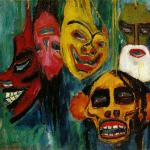
Source: Flicker user Mike
License: Creative Commons
Most mornings my wife and I walk our dogs early in the morning. I mean, early. The goal is solitude. We hope to steal a few quiet moments with the animals before the day gets too hectic, the sun too hot. There’s also a practical matter: our neighborhood is crawling with dogs, specifically German Shepherds. And one of our boys really, really hates German Shepherds. Every now and again, the darkness throws out some sound that makes the two- or three-block walk bone-chilling. Owl hoots are the most common. But there was that day we kept hearing phantom engine sounds like a never-ending, unbelievably poorly timed drag race. The woods emitted what sounded like cackling laughter once. Shouts and screams.
When we talk about getting scared, we like to mention what we see: this or that gory death, a horrible monster half-obscured by the night, a little kid grinning a malevolent grin. Sound is there, of course. The real, hardcore cinephiles love to talk about it. But it’s usually little more than a ballast, a +10 modifier on a scene’s scare score.
Jerzy Skolimowski’s The Shout (1978) is an argument for the primacy of sound in horror. The situation is frightening enough: Anthony Fielding (John Hurt) and his wife, Rachel (Susannah York), welcome a mysterious, seemingly insane drifter, Crossley (Alan Bates), into their rural Devonshire cottage. Crossley eats mysteriously small quantities of Sunday Roast, claims not to have eaten in two days, and regales the couple with tales of 18 years in the Australian Outback, where he confesses to have taken an Aboriginal bride and killed his many children. Better him than the harsh Outback do it, you see. In time, he goes from asking questions about theology (“isn’t the body just a prison for the soul?”—I’m paraphrasing) to bragging that he can shout so powerfully it kills anyone around. His magic even allows him to steal Rachel and drive poor Anthony insane.
There is an irony in Crossley’s weapons of choice: Anthony is an avant-garde composer and church organist. He doesn’t seem to believe in much, at least not in God. His musical interest is driven by recording and sampling for an ASMR video from hell: a bee trapped in a glass jar attached to his mic, a lit cigarette burning, then ash falling away, at earth-shaking volume, the sound of bare flesh punching the microphone. It’s not clear why he’s fascinated with these sounds; they’re terrifying but also empty. They push, presumably, some envelope somehow. Wherever and whatever it is, his compositions (not that we ever hear one) are emptier than even the half-hearted devotion he shows in playing hymns. Crossley tells him as much.
Skolimowski cuts these recording sessions into musical montages, overwhelming little numbers that punctuate and elevate the tension in the Fielding home. Crossley annoys both Anthony and Rachel at first. But soon each is seduced by his magic. She wants his body; he must hear this shout. Anthony can’t escape, even to the point of death, his obsession with sound. Much like his music, the Shout leaves him empty (surviving only because he plugs his ears with cotton) and unable to defend himself.
Anthony is fixated on nothing, on air moving. Deep down, isn’t that what we all fear? What we love, what we obsess over, that it signifies nothing. In this director’s hands, this emptiness goes from neutral, exhausting, though harmless, to a representation of the agony inflected on Anthony and Rachel by Crossley the gleeful demoniac. The musician’s own recordings stab one into another into another as the couple bursts apart.
But even that severance is no ending. The frame narrative finds Crossley at an asylum’s cricket match, keeping score with Robert Graves (Tim Curry). Both he and Anthony are patients there now. Whenever we return to this cinematic present, we are subtly but constantly assaulted by the squawks of birds, the screams of inmates (in joy and in terror), and the cracks of bats. The sound never stops, so the tension never quite breaks. The Shout leaves us feeling uneasy, dirty, even empty, afraid to give voice to the primal fear depicted on screen.
Robert Graves, on whose short story the movie is based, seems to have had this in mind all along:
“Come, surly fellow, come! A song!
“What, madmen? Sing to you?
Choose from the clouded tales of wrong
And terror I bring to you. (“Ghost-Raddled”)













